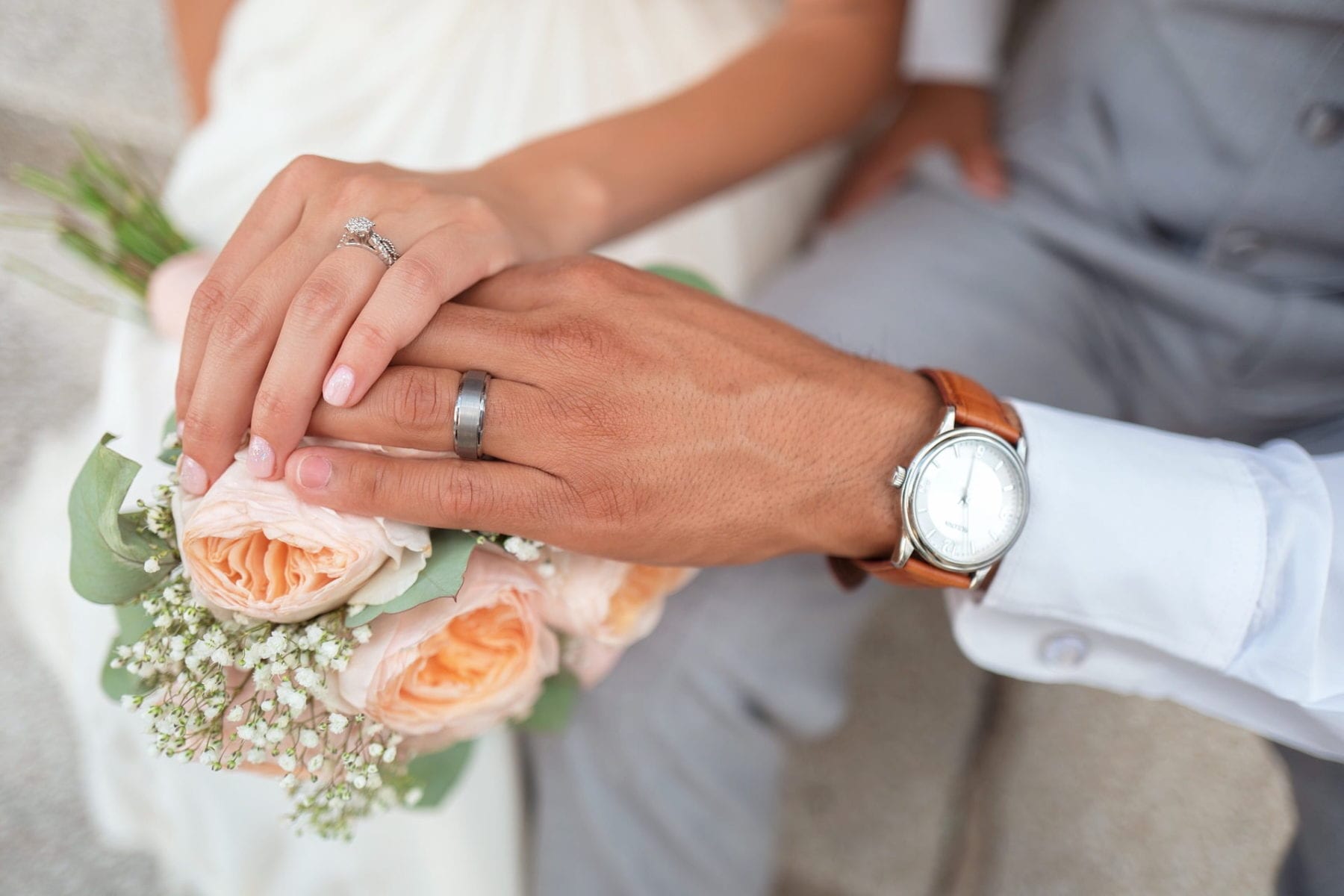
How To Combine Finances After Marriage
As an Amazon Associate I earn from qualifying purchases. We may earn money or products from other companies mentioned in this post at no cost to you!
Reading Time: 6 minutesCongrats! You’re married! And now you’re ready to have your bank accounts be married, too. You may have gone back and forth in your mind about whether it’s a good idea to combine finances with your new spouse. I’m here to tell you that it most definitely is! I would go so far to say that it is essential.
If you’re trying to figure out the best way to do it, kudos to you for making this choice. And, if you’re on the fence, I hope you’ll read this with an open mind while you’re still deciding to make that next step.
Isn’t Combining Finances Easy?
Tackling finances in a marriage can be trickier than you think, something you think you can be prepared for until you’re actually in the middle of it. I went into marriage with the idea that of course we’re going to combine our finances, we both work, so how hard can that be?
I’m sure those who have been married are already laughing at my naivete because it’s HARD! It’s hard. Especially when you both are bringing in paychecks, you may think this will be like when you had roommates and you just contribute to the household. But being married is so much different than having roommate. You’re not just combining numbers.
For example, I made really good money, owned a home, loved to travel and ski, and was generally pretty frugal. My husband made an average salary, owned some furniture, and liked eating out A LOT. I felt that I had way more than I needed but still thought that it was wise to preserve my funds for my own financial security. My husband never felt like he was going to have enough and would always be “broke” so didn’t bother trying to keep anything in his pocket. These are two completely different mentalities, and it caused a lot of frustration during our first year of marriage.
I’d heard the #1 cause of divorce was over finances, and I was beginning to see why.
You May Think It’s Just Joint Banking Account, But It’s Not.
So, why wasn’t it working? We had joint accounts, both our paychecks were going into them, wasn’t it enough that our finances were “combined”?
What was really going on was that there was no real “combining” of what was really important. What you don’t think about- what I didn’t think about- is that you’re having to combine lifestyles, as well as each other’s psychological relationships with money.
When you hear about combining your finances in marriage, it means more than just having a shared checking account. We needed combined goals to truly make this work. It’s not just combined financial goals, but lifestyle goals, as well, because your lifestyle directs where your finances will go. We had to come together and talk about how we were going to live our joint lives.
I didn’t eat out as much- I thought it was a waste of money and also wasn’t healthy. I had a six figure salary and would eat PB&J’s for lunch. My husband would eat out every day, almost for all three meals, if he could. The cost to his wallet and health wasn’t important to him. I felt he was wasting money, and his attitude was that we could afford it. It was causing friction that I didn’t want us to have.
How Did We Finally Combine Finances?
I fully credit one thing: a budget.
We got together and worked on a joint budget. My husband never budgeted before, and, honestly, I never truly “budgeted” either. I had always just mentally tried to live on a certain amount every two weeks and saved the leftover of my paycheck. That was not a solid budgeting system.
I do regret not having myself on a budget before, and it does make me wonder how much more I could have saved. But, when my husband and I came together and made budgeting decisions together, it changed everything for us.
The easy part was: Okay, we need X dollars for mortgage, utilities, etc. The hard part was deciding how we both decided to spend the discretionary money- how much was to be used for “fun” and how much should be put in savings. This conversation helped us to start aligning our joint lifestyle and not just our joint checkbook.
Is It Really Better To Combine Finances?
I’m sure some are rolling their eyes that we were simply giving up all our individuality, but that actually wasn’t the case. I feel we ended up adding to our lifestyles because we still had our individual ones, but now also a joint one.
I didn’t have to give up my travelling. We just budget for it and do it together! I didn’t have to give up skiing becuase, again, we budget for it and do it together!
And it’s not like I actually hate eating out either, so we budgeted to have date nights so we could eat out together! Sometimes that means going to nice restaurants, other times it’s fast food. The less expensive the food is, the more date nights I get! Budgeting for dates alone turned a source of frustration (eating out) into something that I actually wanted!
We both moved out of our own little lifestyle boxes and started to enjoy the things that the other person really enjoyed. It was like getting to start over dating again, but to a new level.
Creating our household budget got us to talk about our expectations and make financial decisions together. I can’t tell you how much of a game changer it has been. While we didn’t have marriage ending fights about it before, we literally don’t have any fights about it at all now. We still have our own previous psychological biases with money, that actually hasn’t changed. What changed is how we’ve decided to handle our joint finances and we just follow the guidelines that we’ve laid out for ourselves.
Combine Finances… But Have Separate Accounts
Besides having a joint budget, we also agreed that we would budget an amount for us each to have in an individual account.
You may be thinking “What? Why combine accounts but keep separate ones?” Hear me out, though, because it seriously helped us.
We make jokes and call this money an allowance, stipend, or lunch money. It’s actually just money that we’ve agreed that the other can spend however they want. Although both our names are on these accounts, we refer to them as “his” and “hers” (you can read more about it here).
Maintaining these separate accounts allows us to spend money freely without checking in with the spouse or seeing if it’s in our budget. If my husband wants to eat out, he can do that as much as he wants until he’s out of “his” money. It honestly doesn’t get to me like it used to because I know he’s using “his” money.
The Steps To Combine Finances
Here’s a recap to help you start your financial journey jointly and with little friction:
1. Work on a joint budget!
Decide how much you want to live on. You may think this is just the sum of your two paychecks, but that’s not what I mean. Just because you have two paychecks doesn’t mean that you need to be living to the max of both your paychecks. You should be setting aside money for your retirement accounts, savings, maybe HSA’s, and covering all your normal recurring expenses. What you’re left with is for discretionary spending. Decide how much you think is reasonable to spend on gas, groceries, haircuts, and whatever else you’ll typically buy in a month. Be sure to include categories for your regular fun activities that you want to do. When you have that figure in mind, decide what is important to both of you to be able to spend your money on and set a reasonable- and agreed upon- amount for that category.
2. Set up your joint accounts.
You should at least have a “house” account in which the bulk of your paychecks go. This is the account out of which you’ll pay your bills, buy groceries and other essentials, etc.
3. Have “his” and “her” money.
Then you should have two additional accounts (still set up jointly) to be used by each of you separately. We call them the “his” and “hers” accounts. Decide how much each of you should get as an “allowance”. This number shouldn’t be exorbitant but enough for each person to spend freely as they choose. Then move that money to each person’s account that you established in step #2, almost like paying a bill. That money is now out of the “house” money and is not meant to be spent on groceries or things like that. That money can be spent by the other person however they want, no checking in with their spouse.
Closing Thoughts
This is certainly not an all-inclusive list of the accounts you need to combine after marriage nor is it the end of your financial discussions with your spouse, but it is a good place to start. There’s a lot more that evolves from this discussion- such as how much each is saving for retirement, life insurance and wills- but this is a good first step into what should become a more in depth topic for your married finances. Once you start living on the joint budget that you both worked on, your new lifestyle will start becoming a habit and make your other follow-up discussions a lot easier.
RELATED
For details on setting up a budget, see my post about beginner budgeting
IF YOU WANT TO SEE MORE…
Consider subscribing to my e-mail list. You can always unsubscribe, I won’t spam you!
Follow me on Facebook, Instagram, or Twitter.
Save this post on Pinterest by using the share buttons, and follow me, too!
If you want to start a blogging business, check out this FREE course!
If you want to make money from a blog, check out this program that got me started making my own money blogging!






8 Comments
BearMoney Dan
We did the exact same thing with our joint finances, it’s a lifesaver! A savings and a checking while keeping our own funny money separately. Sure we now have 12 accounts between us at 4 different banks but I don’t have to see the $200 bill for a hairstylist come out of my nachos fund!
Cristian @ Financial Alien
Good article! I am a big advocate of combining finances when married. My wife ended up doing the same as you, Ashley. We combined everything into a single account, from which we pay all of our bills, but we also have separate “fun” accounts that we fund every month and can use for anything we want without having to check with each other.
Steve @ The Frugal Expat
Combining finances after marriage can be quite hard. My wife and I started to create a budget together. It was basically a way to track our spending. My wife didn’t live on a budget and just wanted to save money. I wanted to see how much we were saving. Making that budget really made us think about money better. We also have separate accounts. We both make about the same amount, so I don’t touch my account, and we spend my wife’s. That way we are saving half of our income at the beginning of each month. I can then transfer that money to the U.S. and invest it. Marriage and money can be hard. These are some great tips to help out.
Robyn
Money and marriage is complicated! I think the most important thing, no matter how you decide to work your money, is TRANSPARENCY and COMMUNICATION.
Whether you have joint accounts, separate accounts, or a mix- be open and honest with each other.
Adam Wilson
I would encourage people to get their initial finances separate. All money made in a marriage is considered marital property but it’s important to look out for yourself also because you never know what people will do in the future. The best way to combine your finances with imputinity is a with a prenuptinal agreement.
Teresa
Really inspiring article! Lots of good ideas 🙂
Adam Wilson
I would think twice before combining your money. At the very least they should become familiar with the divorce laws in the state they choose to live in. Many states don’t even dictate how much spousal support should be paid creating free rein for abusive lawyers to freeze assets, encourage people to lie and often leave one party losing more than 50%. A prenup can solve these problems.
Annalee Walkers
Spot on with this write-up, I absolutely feel this website needs much more attention. I’ll probably be back again to see more, thanks for the advice!|